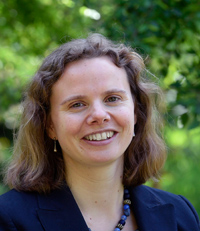Tessa Quax receives Beijerinck Premium
Tessa Quax of the Groningen Biomolecular Sciences and Biotechnology Institute (GBB) receives the Beijerinck Premium 2022 of the KNAW worth EUR 25,000 for her research on microbial virology. She will receive the premium at the Dutch Annual Virology Symposium on March 3, 2022. The Beijerinck Premium is awarded annually to a researcher who is at the beginning of his or her career and who is conducting outstanding virus-related research at a Dutch research institution.

Tessa Quax studies the mechanisms by which viruses infect microorganisms, the so called archaea. Archaea are single-celled organisms that, for example, occur in salt lakes and hot springs. Quax started her career at the Insitut Pasteur in Paris, where she conducted research on viruses from hot springs. Her passion for viruses and archaea led her to renowned research institutes in Belgium and Germany, where she specialized in molecular techniques to conduct research on archaea and their viruses. She has been an Associate Professor at the University of Groningen since 2021. Her research contributes to a better understanding of the role of viruses in nature and of the origin and evolution of viruses in general.
Recently, Tessa Quax also received an ERC Starting Grant and a KNAW Early Career Award.
| Last modified: | 25 January 2022 1.02 p.m. |
More news
-
03 April 2025
IMChip and MimeCure in top 10 of the national Academic Startup Competition
Prof. Tamalika Banerjee’s startup IMChip and Prof. Erik Frijlink and Dr. Luke van der Koog’s startup MimeCure have made it into the top 10 of the national Academic Startup Competition.
-
01 April 2025
NSC’s electoral reform plan may have unwanted consequences
The new voting system, proposed by minister Uitermark, could jeopardize the fundamental principle of proportional representation, says Davide Grossi, Professor of Collective Decision Making and Computation at the University of Groningen
-
01 April 2025
'Diversity leads to better science'
In addition to her biological research on ageing, Hannah Dugdale also studies disparities relating to diversity in science. Thanks to the latter, she is one of the two 2024 laureates of the Athena Award, an NWO prize for successful and inspiring...
